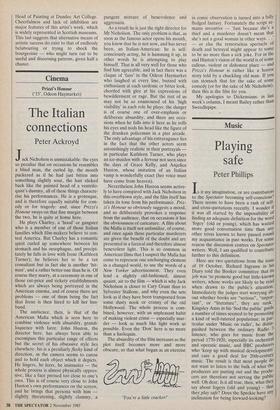Cinema
Prizzi's Honour (`15', Odeon Haymarket)
The Italian connections
Peter Ackroyd
Jack Nicholson is unmistakable: the eyes so peculiar that on occasions he resembles a blind man, the curled lip, the mouth puckered as if he had just bitten into something slightly sour, the hair slicked back like the painted head of a ventrilo- quist's dummy, all of these things characte- rise his performances. He is a grotesque, and is therefore equally suitable for com- edy or for tragedy: and, since Prizzi's Honour sways on that fine margin between the two, he is quite at home here.
He plays Charley, a 'hood' or gangster who is a member of one of those Italian families which film-makers believe to con- trol America. But Charley has a romantic spirit curled up somewhere between his stomach and his oesophagus, and precipi- tately he falls in love with Irene (Kathleen Turner); he believes her to be a tax consultant but in fact she is another 'hit- man', and a rather better one than he is. Of course they marry, at a ceremony in one of those cut-price and rickety establishments which are always being portrayed in the American cinema, and of course there are problems — one of them being the fact that Irene is then hired to kill her hus- band.
The ambience, then, is that of the American Mafia which is seen here to combine violence with absurdity, grandi- loquence with farce. John Huston, the director here, has always been able to encompass this particular range of effects but the secret of his obsessive style lies elsewhere: his is a peculiarly fleshy kind of direction, as the camera seems to caress and to hold each object which it depicts. He lingers, he leers, he insinuates — the whole process is almost physically oppres- sive, like a face pressed too close to one's own. This is of course very close to John Huston's own performances on the screen, and he brings that persona with him slightly threatening, slightly clammy, a pungent mixture of benevolence and aggression.
As a result he is just the right director for Mr Nicholson. The only problem is that, as soon as the famous actor opens his mouth, you know that he is not now, and has never been, an Italian-American: he is self- consciously acting, he is hamming it up, in other words he is attempting to play himself. That is all very well for those who find him agreeable, and in fact there was a claque of 'fans' in the Odeon Haymarket who laughed at every line, buzzed with enthusiasm at each sardonic or bitter look, chortled with glee at his expressions of bewilderment or rage. But the rest of us may not be so enamoured of his 'high visibility' in each role he plays: the danger is of course one of over-emphasis or deliberate absurdity, and there are occa- sions when he falls into it here as he rolls his eyes and nods his head like the figure of the drunken policeman in a pier arcade. The only advantage of his extravagance lies in the fact that the other actors seem astonishingly realistic in their portrayals in particular Kathleen Turner, who plays an ice-maiden with a fervour not seen since the days of Grace Kelly, and Anjelica Huston, whose imitation of an Italian vamp is wonderfully exact (her voice must have come from heaven).
Nevertheless John Huston seems active- ly to have conspired with Jack Nicholson in this overblown style, and the film itself has taken its tone from his performance. Priz- zi's Honour so obviously suggests a mood, and so deliberately provokes a response from the audience, that on occasions it has the obviousness of caricature. A film about the Mafia is itself not unfamiliar, of course, and once again these particular murderers are given the benefit of the doubt and are presented in a farcical and therefore almost benevolent light. This is so common in American films that I suspect the Mafia has come to represent one unchanging element in a changed world, to use the words of a New Yorker advertisement. They even lend . a slightly old-fashioned, almost quaint, air to the film — which is why Jack Nicholson is closer to Cary Grant than to Sylvester Stallone, and why even the sets look as if they have been transported from some dusty nook or cranny of the old Hollywood. The whole process is com- bined, however, with an unpleasant habit of making violent crime — especially mur- der — look as much like light work as possible. Even the 'Don' here is no more than a harlequin.
The absurdity of the film increases as the plot itself becomes more and more obscure, so that what began as an exercise 'You're a little cracker!'
in comic observation is turned into a fully fledged fantasy. Fortunately the script re- mains inventive — 'Just because she's a thief and a murderer doesn't mean that she's not a good woman in other ways.. — or else the remorseless spectacle of death and betrayal might appear to some to be no more than a sick joke. For in the end Huston's vision of the world is of some callous, violent or dishonest place -- and Prizzi's Honour is rather like a horror story told by a chuckling old man. If you can stomach that for the sake of some comedy (or for the sake of Mr Nicholson), then this is the film for you. My apologies to Dickensians: in last week's column, I meant Bailey rather than Sweedlepipe.






















































 Previous page
Previous page